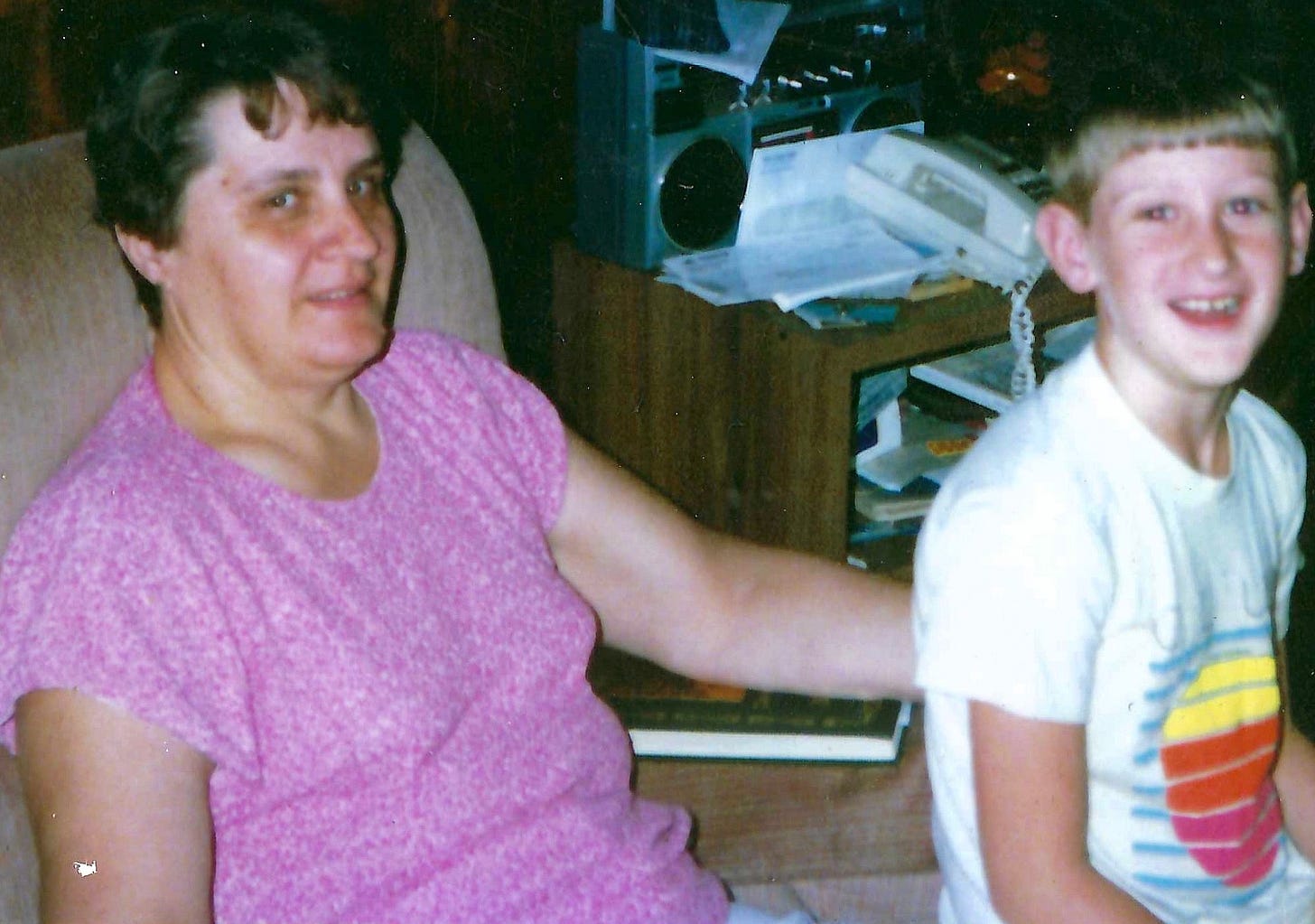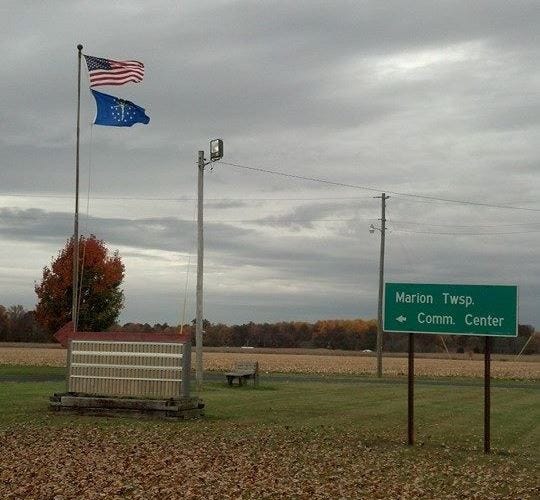Author’s Note: This isn’t a biography—it’s a celebration. My Grandma Carol Pettit left her mark on a whole community. Many of her friends “adopted” me along the way. This is a love letter to them all.
Dedicated to Aunt Susan Kinney, in Loving Memory of Her Mother—and My Grandmother—Carol Pettit
The Hood River Valley
South of the Columbia River, the Hood River winds its way toward snow-capped Mt. Hood. To the west: the Cascade Mountains. Just over the ridge to the east: the Oregon High Desert. In between lies a lush, rolling paradise of fruit trees and vineyards—the Hood River Valley. More than a flat stretch of farmland, it’s a landscape with drama.
And it’s where my grandma, Carol Campbell Pettit, grew up.
Boisterous. A booming voice. A loud laugh. Relentlessly opinionated, unfailingly optimistic, fiercely determined. My grandma was larger than life, and she stayed that way her whole life.
At 18, Grandma Carol left her family and traded the grandeur of the Hood River Valley for the farmlands of Jennings County, Indiana. The landscape was beautiful in a completely different way—and so were the people. Warm, loving, and plainspoken, they were a perfect match for her.
A New Place, A New Family
Grandma was tall and physically strong—a big frame to match an even bigger personality. She was never overweight, but she wasn’t petite either. People trying to be polite would say she was “big-boned.” People trying to be honest would say, “Don’t arm wrestle her.”
My grandparents met in 1957 when Grandpa was in the Air Force. They married in November of that year and moved to Jennings County once Grandpa’s active duty ended. They settled in a little house next to my great-grandparents in Bigger Township—where Uncle Dave, Dad, and Aunt Susan were all born.
I don’t think Grandpa’s family was used to someone as loud and outspoken as Grandma. She spoke her mind—about people, their choices, sometimes even their appearances. Probably too much. The Pettit side had opinions too, but they were softer-spoken and more selective about sharing them.
Grandma had a gift for bold initiative—which is a great trait, unless the problem belongs to someone else. One story: a cousin of my dad’s was still clinging to a pacifier longer than Grandma thought appropriate. So she marched over, yanked it out of the kid’s mouth, and stuffed it down a crawdad hole.
Was that her call to make? No. Did it work? Absolutely.
Grandpa eventually found work on larger farming operations. He took a job with Charlie Ross, and he and Grandma moved their growing family to a small house on Charlie’s farm. The Rosses were connected to both sides of my family—Charlie’s mother, Aunt Carrie Ross, was the sister of my Great-Grandpa Will Simpson. Aunt Carrie may well have been the kindest woman in Jennings County history.
Setting Up in Lovett Township
Things really started to come together when they moved to Lovett Township—where their youngest, Uncle Jim, was born. For a few years, they lived in a small 19th-century brick house. But in 1967, they bought the ranch-style home across the road. It’s where Grandma would live for the rest of her life.
Grandpa left his job with Charlie and started his own operation. Their property had several barns and wide, working fields. Each year brought corn and soybeans, small patches of tobacco, and the occasional livestock.
As the kids got older, they pitched in—and so did Grandma. She handled the colossal John Deere with the giant tires, disking the fields row after row, while Grandpa followed behind on the smaller planter tractor, its hoppers rattling with seed.
She didn’t just drive that thing—she commanded it. If the farm had a battleship, she was the admiral.
My Arrival on the Scene
I had very young parents and grandparents—Grandma was only 39 when I was born. My life has looked drastically different; I didn’t have a child until I was 36.
For the first few years of my life, we lived in the old brick house across from my grandparents. The place was falling apart—rodents from the fields treated it like a vacation home. My parents had little money. My grandparents helped when they could, but they had a farm to run and kids still at home.
But living by my grandparents is something I’ve missed ever since we left that dilapidated house. I saw them every day and was part of their daily rhythm. I rode in the cab of Grandma’s gigantic tractor as she disked the fields. I rode on the back of the smaller planter tractor, helped strip tobacco leaves—and got a head start on toddler lung cancer.
Grandma knew early on I wasn’t cut out for farm life. At age three, she started training me in history, geography, and genealogy. As soon as I learned to read, she handed me whatever books sat around the house. I became obsessed with encyclopedias. Hers were 20 years out of date, and still the most fascinating thing I’d ever seen.
The Neighbors
Grandma was friendly with the neighbors—the Fleeks, the Griders, and an eccentric woman everyone just called “Ma” Stanley. To this day, I don’t know what her actual first name was.
There was also an elderly gentleman who lived up the hill. I never knew him—he died before I was born—and I couldn’t tell you his name. But every year, Grandma made sure he had a place at Thanksgiving. He had no family, so she adopted him for the day.
Ira and Muriel Vance lived about a mile away. They were older, and Ira was physically disabled. Grandma often stopped by to help with whatever they needed, and she and Muriel talked on the phone all the time. I remember going with her to visit them.
Our closest neighbors were the Websters. Lida and Grandma either talked on the phone or saw each other almost every day. In a county-wide kindness contest, Lida would’ve given Aunt Carrie Ross a run for her money. Both women gave hugs that engulfed you—in hope, in safety, in love.
Lida’s husband, Roy, was cheerful and full of stories. He was a World War II veteran and watched the Enola Gay take off to drop the bomb on Hiroshima. Their house was second only to Grandma and Grandpa’s as my favorite place to be.
The Webster trick-or-treat yield was the gold standard, and Lida’s Christmas goodies were non-negotiable. Some places just radiate goodness—you feel it before anyone even says a word.
The Websters had three children: David, Pam, and Sally. I knew Sally best—she was in my mom’s class, and Mom and Aunt Susan were childhood friends of hers. She’s always been a talented guitar player and songwriter. Her poetry is an inspiration to the rest of us trying to write poems—especially those still recovering from academic over-analysis.
Roy passed about 15 years ago, and Lida just a few months ago at 96. Pam and Sally live in the old house and keep it up with care.
The Craddocks
John and Betty Craddock were my grandparents’ closest “couple friends.” Grandpa and Johnny had played basketball together at Vernon High School, and both became farmers, naturally. I always figured Grandma and Betty bonded because they were both outsiders—Grandma from Oregon, Betty from Louisiana.
Their kids grew up playing sports together, often as teammates. Most notably, Aunt Susan and Janet Craddock played volleyball all the way to Division I at Indiana State. The Craddocks and my grandparents held basketball season tickets long after their kids had graduated. Grandma kept going to every game—right up until about three months before she died.
John and Betty Craddock were always kind to me—and funny, too. For a few years, we lived right across the road from them, in a house they had lived in for years.
In fourth grade, Betty’s sister in Louisiana had a massive stroke. Betty went down to be with her, and Grandma insisted I visit Johnny every day “so he wouldn’t get lonely.” I did as I was told—because I’d seen what Grandma did for people she cared about. And it usually involved company, care, and no shortage of opinions.
The Other Voice at Tea Creek
Much of my family’s life revolved around Tea Creek Baptist Church, about five miles away. Many of our closest friends—and most of my grandparents’ crop-share partners—were there. Grandpa was a deacon, and Grandma’s presence was unmistakable—in volume, laughter, and relentless extroversion.
Her boisterous, talkative nature was matched by one person: Earl Morin—a Tea Creek institution, and great-uncle of—the legendary Bobbi Morin. My grandparents were close friends with Earl and his wife, Rosemary. I remember Earl and Grandma holding court at top volume, followed by laughter that echoed through the whole building.
My dad and his siblings were close with the Morin kids—Earl’s son Kenny was the best man in my parents’ wedding. The families often went boating and camping together, well into my childhood.
Earl and Rosemary were always good to me. When I was a kid and showed an interest in politics, Earl ran with it. Every time he saw me: “There’s the future governor of Indiana!” Thank God that didn’t happen—I would’ve been impeached in the first term for excessive overthinking. But Earl believed in me. And he loved my family.
Rosemary was my Sunday School teacher for years—and patiently endured my tendency to overcomplicate theology. I wasn’t satisfied with “Jesus loves me.” I wanted to close all the loopholes that might still send me to hell—and point out all the technicalities that might get someone else there. She’d smile, chuckle, and say, “Oh Kent, you ask too many questions.”
They were generous, too—birthday cash, Sunday School trips to Clifty Falls (the only place around with a waterslide), and Earl buying me the biggest hot fudge sundae Dairy Queen would allow.
The Fields and Folks of 600 South
Beyond their own land, the biggest part of Grandma and Grandpa’s farming came from crop-share leases with Earl and his neighbors on County Road 600 South. In those deals, the farmer got two-thirds of the revenue; the landowner got one-third.
I associate Grandma with 600 South as much as I do with the people who lived there. They weren’t lease sharers to her—they were friends. Between tractor shifts or after dropping off lunch, she’d stop by their houses, sometimes for hours.
I went with her on many of those visits—to some of the greatest people I’ve ever known.
Heading west past the German Cemetery, County Road 600 straddles Lovett and Marion Townships—Lovett to the north, Marion to the south. Just up on your left was the home of one of my favorite people of all-time: Evelyn Mousa.
Evelyn Mousa
Evelyn was originally from Westport, Indiana. Her husband, Gerald—long dead by then—was a cousin of Earl Morin’s mother. As a kid, I’d laugh when she’d tell me, matter-of-factly and with a touch of humor, “My husband died at the kitchen table.” Evelyn was highly educated and a gifted musician, serving as Tea Creek’s pianist and organist for over 50 years.
Though I’m sure she liked where she lived, Evelyn was never thrilled to be a resident of Marion Township. Folks from other parts of the county liked to poke fun at Marion for being a little…slow. Evelyn even once tried to vote in Lovett. But to be fair, her property in Marion had the best morel woods I’ve ever seen.
Evelyn was incredibly generous to my struggling parents. She regularly gave them cash, and when I was born, she opened a savings account just for me. Every birthday and Christmas (and a few other times, just because), she’d send money—often tucked into a card full of careful handwriting. At Easter, she gave me baskets big enough to make the Easter Bunny look like he was slacking. And getting to visit her with Grandma was icing on the cake.
The Littrells
The Littrells lived directly across from Evelyn, though their house sat farther back from the road. Helen Littrell was Earl Morin’s first cousin, and the Littrells’ house was one of my favorite places to go in the whole county. Trick-or-treating there rivaled the Websters, but it was a joy to stop by any time of the year.
Two of the daughters, Dot and Edna, lived at home during the years I visited. They and their mom were the ones I interacted with the most. We always sat in the kitchen—I don’t remember ever seeing the rest of the house. Everyone just naturally ended up there. Usually, I’d be with Grandma, but sometimes with Aunt Susan or Mom.
The Littrells made me feel like I was one of theirs. One time at North Vernon Elementary, we were getting seated in the gym for a class program, with family members in the bleachers. As my class settled on the floor nearby, something smacked me on the back of the head. I turned around—furious—and saw Dot, holding a large folder. She and Helen were sitting on the front row, laughing it up. And I couldn’t help but smile.
Dot often led children’s programs at Tea Creek. She was enthusiastic and clearly cared about us. As I got older, I saw more of Edna, a top-notch administrative assistant at Jennings County Middle School—no-nonsense when needed, but just as warm and encouraging as Dot the rest of the time.
After Grandma’s death and my parents’ divorce, Edna looked out for me. She gave me jobs to do and had me help with summer orientation—just to get me out of the house. The Littrells did those things because they were loving people, and because they honored Grandma.
Social Dynamics and Broken Hearts
Down the road on the Marion side was Mrs. Iris Garrity—nice but austere. Unlike everyone else down there, whom we called by first name, she was always “Mrs. Garrity.” Her son Bill was a trucker who inherited the house and land. Her daughter, Wilma Binford, was a teacher at North Vernon Elementary—kind like her mother, but old-school.
Astute in social situations, Grandma easily navigated between different types of people, building rapport and trust. She was deferential when needed—“Yes, ma’am” to Mrs. Garrity—but informal, noisy, and raucous (in the best way) with someone like Earl Morin.
Just off 600 South lived an ancient woman named Doris Hoffman. We farmed her fields, but Grandma made time to visit her—an act of compassion for a lonely woman. I sometimes went along. It was a quiet lesson in empathy for me.
Doris had an old dog, about her age in “dog years.” After one visit, Grandma said, “Whoever goes first—Doris or that dog—the other won’t last long.”
I asked why.
She said, “Because the one left behind will die of a broken heart.”
“You’re not a true Republican”
Carol Pettit’s political zeal was inseparable from her identity. She loved the Republican Party so much that she had an entire shelf of elephant figurines—wooden, plastic, porcelain.
Grandpa chaired the county party for years and won six straight elections—two as Lovett Township trustee, four as county commissioner. Credit his leadership and integrity, but you couldn’t separate his success from Grandma. She was the fire. Her charisma and force of personality held it all together.
At 10, she wanted me to be a legislative page—go to the capitol, watch lawmakers in action, meet your rep, maybe run errands like fetching coffee. She insisted I page for Johnny Nugent, our Republican state senator and her friend. When I got in, she beamed.
But I’d also gotten to know our state rep, Dave Cheatham—a Democrat I liked just as much. When I mentioned paging for him, Grandma went quiet. She didn’t discourage it, but the approval wasn’t exactly overwhelming.
In the 1990 election, Cheatham was running unopposed. I couldn’t vote, but Grandma gave me a sample ballot to fill out. When she saw I’d checked his name, she shook her head and said quietly, “You’re not a true Republican”—even though he had no opponent.
A Diagnosis
In 1988, Grandma began to experience severe fatigue and chest pain. She was diagnosed with cardiomyopathy—her heart was enlarging, and a transplant was her only hope. A few months later, doctors saw her heart had stopped enlarging. She was stable and taken off the transplant list. Still disabled, she stayed active—if she got enough rest.
I’ll never forget the first week of December 1990—the last week I ever spent at her house. While my parents were away, we stayed with Grandma and Grandpa. I got precious time with the dearest person of my life—unaware she’d be gone soon.
Midway through that week, she got an update—her heart was enlarging again, fast. She told me not to worry: she’d go back on the transplant list, and it would fix everything—back to the way things were.
Final Decline
Her decline was rapid. Within weeks, she overheated and became short of breath at a basketball game, leaving before halftime. The change since Thanksgiving was striking. Her rare blood type made finding a donor a longshot. As 1991 began, she grew weaker. She was in and out of the hospital—usually St. Vincent in Indianapolis.
I remember Earl being invited over just to bring his usual laughs and rowdiness—and it did Grandma good. The same went for visits from the Craddocks or Lida Webster.
My last good day with her was March 27, 1991. She was being discharged from St. Vincent. Grandpa asked me to ride along since I was on spring break. When we got there, she had more energy than she’d had in months.
While Grandpa handled discharge papers, Grandma had me hop up beside her in the hospital bed to watch I Love Lucy—the episode where Lucy works at the chocolate factory. Lucy wasn’t cool with the North Vernon Elementary fifth graders—you talked about Unsolved Mysteries or Steve Urkel, not 1950s reruns. But that day, it was the greatest thing I ever watched. Like 100% TASH spelling books in Mr. Fox’s classroom, I couldn’t stop laughing. Grandma whispered, “Shhh—people here are very sick,” though she couldn’t help but laugh, too.
I saw her only a couple more times—briefly. And never again like she was on March 27.
The Line They Formed
Grandma passed away in the early hours of April 28, 1991, one month shy of her 51st birthday. Her friend Lillian Carmer, North Vernon Plain Dealer reporter, wrote a beautiful obituary that made the front page.
The community turned out in droves. Hundreds lined up at the Dove-Sharp Funeral Home—out the door, down the sidewalk, and along State Street. Everyone seemed to be there: old friends, church folks, political allies (and a few opponents), teachers and friends from North Vernon Elementary, Johnny Nugent, even someone from U.S. Senator Lugar’s office.
Several people whispered to me: “Never forget what you meant to her.” It still brings me to tears.
What They Built Together
When I was in Hood River 15 years ago, I said, “It must’ve been a shock for Grandma to leave this for Jennings County at 18.” Her brother, Uncle Buddy, replied, “She never had any regrets.”
You could say the hearty, boisterous girl from the West Coast won over an entire county. But it was mutual—the people won her over, too. She—and those who supported her as she served and befriended them—created something rare: a community of beauty, love, acceptance, and strength. Jennings County at its best.








